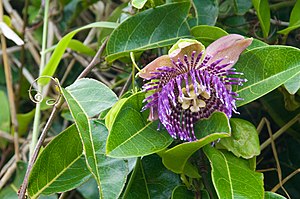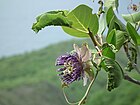Note: This is a project under development. The articles on this wiki are just being initiated and broadly incomplete. You can Help creating new pages.
Difference between revisions of "Passiflora laurifolia"
(Created page with "{{stub}} ==Uses== {{Uses|}}, {{Uses|}}, {{Uses|}}, {{Uses|}}, {{Uses|}}, {{Uses|}}, {{Uses|}}, {{Uses|}}, {{Uses|}}, {{Uses|}}, {{Uses|}}.<ref name="Uses"/> ==Parts Used== {{...") |
|||
| (3 intermediate revisions by 2 users not shown) | |||
| Line 1: | Line 1: | ||
| − | + | [[File:Passiflora laurifolia.jpg|thumb|right|'''Passiflora laurifolia''']] | |
| + | '''Passiflora laurifolia''' is commonly known as the water lemon, Jamaican honeysuckle, golden bellapple, pomme liane on Martinique & Guadeloupe and orange lilikoi is a species in the family Passifloraceae. It is native to tropical Americas. | ||
==Uses== | ==Uses== | ||
| − | {{Uses|}}, {{Uses| | + | {{Uses|Anthelmintic}}, {{Uses|Syphilitic ulcers}}. |
==Parts Used== | ==Parts Used== | ||
| − | {{Parts Used|}}, {{Parts Used| | + | {{Parts Used|Fruits}}, {{Parts Used|Leaves}}. |
==Chemical Composition== | ==Chemical Composition== | ||
| + | Flavonoids, especially C-glycosyl derivatives of apigenin and luteolin, such as vitexin, isovitexin and orientin, in addition to quercetin, kaempferol, catechin and epicatechin. | ||
<ref name="chemical composition"/> | <ref name="chemical composition"/> | ||
==Common names== | ==Common names== | ||
| − | {{Common names | + | {{Common names|kn=|ml=|sa=|ta=|te=|hi=|en=Water lemon, Jamaican honeysuckle}} |
==Properties== | ==Properties== | ||
Reference: Dravya - Substance, Rasa - Taste, Guna - Qualities, Veerya - Potency, Vipaka - Post-digesion effect, Karma - Pharmacological activity, Prabhava - Therepeutics. | Reference: Dravya - Substance, Rasa - Taste, Guna - Qualities, Veerya - Potency, Vipaka - Post-digesion effect, Karma - Pharmacological activity, Prabhava - Therepeutics. | ||
===Dravya=== | ===Dravya=== | ||
| + | |||
===Rasa=== | ===Rasa=== | ||
| − | |||
===Guna=== | ===Guna=== | ||
| Line 29: | Line 31: | ||
==Habit== | ==Habit== | ||
| − | {{Habit|}} | + | {{Habit|Herbs}} |
==Identification== | ==Identification== | ||
| − | |||
| − | |||
| − | |||
| − | |||
| − | |||
| − | |||
===Fruit=== | ===Fruit=== | ||
| − | {{Fruit|||| | + | {{Fruit|Simple Fruit|Ovoid|2 in (5.1 cm) long with a diameter of 3 in (7.6 cm)|Green or deep orange skin and white-yellow|}} |
===Other features=== | ===Other features=== | ||
| Line 46: | Line 42: | ||
==Where to get the saplings== | ==Where to get the saplings== | ||
| − | |||
==Mode of Propagation== | ==Mode of Propagation== | ||
| − | {{Propagation|}} | + | {{Propagation|Seeds}}. |
==How to plant/cultivate== | ==How to plant/cultivate== | ||
| − | <ref name="How to plant/cultivate"/> | + | A plant of the hot, wet, lowland tropics, where it is found at elevations up to 500 metres. It grows best in areas where annual daytime temperatures are within the range 22 - 30°c, but can tolerate 12 - 36°c. The plant is not tolerant of frost.<ref name="How to plant/cultivate"/> |
==Commonly seen growing in areas== | ==Commonly seen growing in areas== | ||
| − | {{Commonly seen| | + | {{Commonly seen|Lowland forest}}. |
==Photo Gallery== | ==Photo Gallery== | ||
<gallery class="left" caption="" widths="140px" heights="140px"> | <gallery class="left" caption="" widths="140px" heights="140px"> | ||
| − | + | File:Passiflora Laurifolia - Fruits.jpg | |
| + | File:Passiflora laurifolia martinique.jpg | ||
| + | File:Passiflora Laurifolia - green fruit 1.jpg | ||
| + | File:Passiflora laurifolia (Passifloraceae) 02.jpg | ||
</gallery> | </gallery> | ||
==References== | ==References== | ||
| + | |||
<references> | <references> | ||
| + | <ref name="chemical composition">[https://www.researchgate.net/publication/283119937_Nutritional_Composition_of_Passiflora_Species#:~:text=With%20respect%20to%20the%20chemical,%5B18%5D%20%5B19%5D. Chemical composition]</ref> | ||
| + | <ref name="How to plant/cultivate">[http://tropical.theferns.info/viewtropical.php?id=Passiflora+laurifolia Cultivation Details]</ref> | ||
| + | </references> | ||
| − | + | ==External Links== | |
| − | + | * [https://books.google.co.in/books?id=MN-HeSd771oC&pg=PA262&redir_esc=y#v=onepage&q&f=false Passiflora laurifolia on books google.in] | |
| − | |||
| − | |||
| − | |||
| − | |||
| − | |||
| − | |||
| − | |||
| − | |||
[[Category:Herbs]] | [[Category:Herbs]] | ||
| + | [[Category:Passifloraceae]] | ||
Latest revision as of 11:21, 29 June 2020
Passiflora laurifolia is commonly known as the water lemon, Jamaican honeysuckle, golden bellapple, pomme liane on Martinique & Guadeloupe and orange lilikoi is a species in the family Passifloraceae. It is native to tropical Americas.
Contents
- 1 Uses
- 2 Parts Used
- 3 Chemical Composition
- 4 Common names
- 5 Properties
- 6 Habit
- 7 Identification
- 8 List of Ayurvedic medicine in which the herb is used
- 9 Where to get the saplings
- 10 Mode of Propagation
- 11 How to plant/cultivate
- 12 Commonly seen growing in areas
- 13 Photo Gallery
- 14 References
- 15 External Links
Uses
Anthelmintic, Syphilitic ulcers.
Parts Used
Chemical Composition
Flavonoids, especially C-glycosyl derivatives of apigenin and luteolin, such as vitexin, isovitexin and orientin, in addition to quercetin, kaempferol, catechin and epicatechin. [1]
Common names
| Language | Common name |
|---|---|
| Kannada | |
| Hindi | |
| Malayalam | |
| Tamil | |
| Telugu | |
| Marathi | NA |
| Gujarathi | NA |
| Punjabi | NA |
| Kashmiri | NA |
| Sanskrit | |
| English | Water lemon, Jamaican honeysuckle |
Properties
Reference: Dravya - Substance, Rasa - Taste, Guna - Qualities, Veerya - Potency, Vipaka - Post-digesion effect, Karma - Pharmacological activity, Prabhava - Therepeutics.
Dravya
Rasa
Guna
Veerya
Vipaka
Karma
Prabhava
Habit
Identification
Fruit
| Type | Size | Mass | Appearance | Seeds | More information |
|---|---|---|---|---|---|
| Simple Fruit | Ovoid | 2 in (5.1 cm) long with a diameter of 3 in (7.6 cm) | Green or deep orange skin and white-yellow | {{{6}}} |
Other features
List of Ayurvedic medicine in which the herb is used
Where to get the saplings
Mode of Propagation
How to plant/cultivate
A plant of the hot, wet, lowland tropics, where it is found at elevations up to 500 metres. It grows best in areas where annual daytime temperatures are within the range 22 - 30°c, but can tolerate 12 - 36°c. The plant is not tolerant of frost.[2]
Commonly seen growing in areas
Photo Gallery
References
External Links
- Ayurvedic Herbs known to be helpful to treat Anthelmintic
- Ayurvedic Herbs known to be helpful to treat Syphilitic ulcers
- Herbs with Fruits used in medicine
- Herbs with Leaves used in medicine
- Herbs with common name in English
- Habit - Herbs
- Index of Plants which can be propagated by Seeds
- Herbs that are commonly seen in the region of Lowland forest
- Herbs
- Passifloraceae




